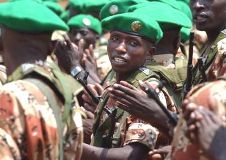Afrcan Union protection force arrives in Darfur
KHARTOUM/ ADDIS ABABA, Aug 15, 2004 (dpa) — Some 155 Rwandan troops comprising the first half of a 300-strong African Union (A.U.) force intended to provide protection to international ceasefire monitors arrived in the war-ravaged region of Darfur in western Sudan over the weekend, A.U. officials said.
 The soldiers, who despite repeated pleas from various aid agencies are not mandated to protect civilians in Darfur or to attempt to disarm the Janjaweed militias, will be joined by 152 Nigerian troops by August 25, according to El Ghassim Wane, Acting Head of the A.U. Conflict Management Centre.
The soldiers, who despite repeated pleas from various aid agencies are not mandated to protect civilians in Darfur or to attempt to disarm the Janjaweed militias, will be joined by 152 Nigerian troops by August 25, according to El Ghassim Wane, Acting Head of the A.U. Conflict Management Centre.
The Rwandan force arrived in separate planes on Saturday and Sunday in El Fasher, capital of North Darfur. Several planeloads of supplies and support equipment essential to their mission had been sent in advance.
On the arrival of the first batch in Darfur Saturday evening, the Sudanese foreign minister Mustafa Osman Ismail said he welcomed the Rwandan force.
Ismail told reporters his government had no reservations about the size of the force but about its mission.
He said “any force of an undefined mission will not be acceptable to us”.
Ismael said, however, that Sudan would be ready to hold a dialogue with the A.U. on the matter of increasing the strength of the African force in Darfur, if the A.U. could convince Khartoum of the necessity of a peacekeeping force.
Wane, speaking in Addis Ababa Saturday, made it clear that the A.U. force was limited to providing protection for 139 ceasefire observers in Darfur and in Abeche, Chad.
Meanwhile, the Rwandan president Paul Kagame said in Kigali he would support a larger force in Darfur with a stronger mandate.
The A.U. has proposed boosting the size of the force to 2,000 troops and giving it full peacekeeping status. This initiative has so far been strongly rejected by the Sudanese government.
Kagame however said the Rwandan soldiers would have to intervene if they witnessed civilians being targeted or killed.
“It is implied, in my view, in their presence there. You cant protect observers without protecting anybody else around,” Kagame said, adding that he viewed the force,s small size as its only limitation.
On July 30, the United Nations Security Council passed a resolution demanding the Sudanese government disarm the Janjaweed and improve the humanitarian situation in Darfur, or face possible sanctions. The U.N. has so far ruled out military intervention.
Up to 50,000 people have died from violence, starvation and disease since the inception of the 18-month conflict in Darfur. At least 1.2 million people have been forced to flee from their homes, while two million are in acute need of food and medical attention.
The Protection Force is to be deployed in six sectors – five in Darfur and one in Abeche – that serve as bases for the Ceasefire Commission (CFC) charged with monitoring violations of a ceasefire agreement between Khartoum and the two main rebel groups in Darfur.
The multi-national team has investigated up to eight reported ceasefire violations, said Wane, although no further details were given.
On Sunday, a high-level delegation of the A.U., headed by the Commissioner for Political Affairs, Julia Dolly Joiner, left for three-day working visit to assess the humanitarian situation in Darfur.
The delegation is to follow up on a mission by the A.U. chief Alpha Oumar Konare in June.
The delegation will see how the present efforts by the A.U. towards alleviating the sufferings of the affected population could be strengthened, the A.U. said in a statement
During its visit the delegation will meet with the authorities in Khartoum and later visit the Darfur region.
In Darfur they are scheduled to meet with the local authorities, humanitarian agencies, internally displaced persons as well as the new A.U. protection force.
The AU Political Commissioner and her delegation were also scheduled to hold talks with members of the CFC based in El-Fasher, capital of North Darfur, on ceasefire violations in the area so far and the protection to be provided by the A.U. Military Observers, with the dispatch of a new protection force from Rwanda.
